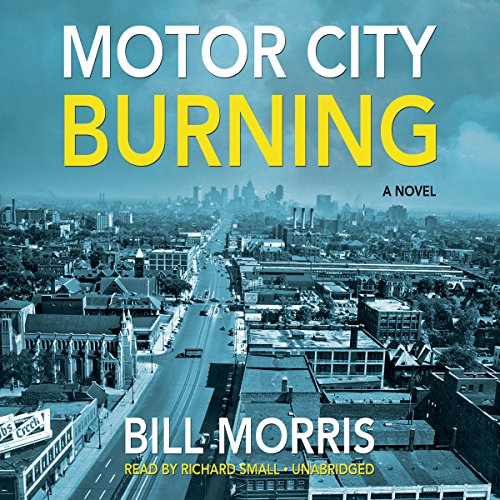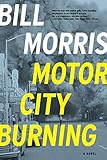
1.
Stretched before me was the brain-dead midriff of Ohio, 200-plus miles of bad road between Cincinnati and Toledo, then another 60 miles to my final destination, a bookstore in Detroit. When you’re on a DIY book tour promoting your new novel, you don’t always get to pick your routes, or your destinations. You just keep moving, hoping an audience shows up at the next stop.
Somewhere outside Middletown, Ohio, I remembered that I had the eight-CD audiobook of my novel in my suitcase. So I pulled off the highway, fired up disc #1, and got back on the road.
From the very first sentence — Uncle Bob wasn’t lying. — I was in a dream state. Like many writers, I read my sentences out loud to make sure they flow. If they sound clunky to my ear, I know they’ll sound clunky to the reader — because it’s a known fact that even when we read silently, we hear the words in our head. Writing is its own form of music. And though I had read my novel aloud to myself many times and had read passages of it aloud to dozens of audiences on my book tour, hearing another person — a trained actor — reading my writing was a curious kick, a revelation. The words I was hearing were deeply familiar yet somehow refreshingly new. The miles flew past. I actually forgot I was in Ohio.
 The voice I was listening to — identified on the case of the audiobook as belonging to one Richard Small — sounded like the voice of a black man. This struck me as an inspired choice because my novel, Motor City Burning, is concerned with the racial divide that has always defined life in my hometown, Detroit. The opening chapter is told from the point of view of the protagonist, Willie Bledsoe, a young black man from Alabama who once stood on the front lines of the civil rights struggle but is now disillusioned and burnt out. He’s driving to Tiger Stadium in Detroit to witness his first major-league baseball game on Opening Day of the 1968 season, Tigers vs. Red Sox. That game was postponed by two days in deference to Martin Luther King Jr.’s funeral in Atlanta, and as Willie Bledsoe parks his car and walks to the ballpark, he can’t get his frustrations with the civil rights movement and its leaders, especially King, out of his head.
The voice I was listening to — identified on the case of the audiobook as belonging to one Richard Small — sounded like the voice of a black man. This struck me as an inspired choice because my novel, Motor City Burning, is concerned with the racial divide that has always defined life in my hometown, Detroit. The opening chapter is told from the point of view of the protagonist, Willie Bledsoe, a young black man from Alabama who once stood on the front lines of the civil rights struggle but is now disillusioned and burnt out. He’s driving to Tiger Stadium in Detroit to witness his first major-league baseball game on Opening Day of the 1968 season, Tigers vs. Red Sox. That game was postponed by two days in deference to Martin Luther King Jr.’s funeral in Atlanta, and as Willie Bledsoe parks his car and walks to the ballpark, he can’t get his frustrations with the civil rights movement and its leaders, especially King, out of his head.
Richard Small’s voice captures Willie’s ambivalence about King in a way I had barely been able to imagine. Small’s voice — vernacular, informal, yet precise — gave new shades of meaning to Willie’s thoughts, including these: “Though he had given up on King years ago, the details about the assassination fascinated him… In Atlanta the coffin was placed on a crude farm wagon that was pulled through the throngs of mourners by two Georgia mules. This attempt to dress the patrician King in the trappings of the common man struck Willie as calculated and deeply dishonest, downright shameful. But hardly surprising. That, after all, was what mythmakers did. Given some of the things he’d heard King say, Willie even believed the man had pursued martyrdom.”
But it was when Small began to speak the novel’s dialog — bringing each character to vivid life through accents and inflections and slang — that I fully appreciated his achievement. Willie befriends a couple of brothers in the centerfield bleachers on Opening Day. Louis Dumars, an autoworker from Louisiana, comes alive through his bullfrog baritone, while the slick criminal-defense lawyer Clyde Holland speaks in a perfectly syncopated street patter. It kept getting better as Small convincingly voiced the novel’s gallery of characters — Willie’s antagonist, Frank Doyle, a white Detroit homicide cop who believes Willie was involved in the last unsolved murder from the previous summer’s riot, plus another cop with a lush Irish brogue, rich white suburbanites, greasers, hippies, rednecks, church women, black hustlers and revolutionaries, the female receptionist at Motown Records, even Martin Luther King Jr.
It was the first time I had heard a professional actor reading my writing — audiobooks were in their infancy when my first two novels were published — and it impressed me deeply. I can do a fair approximation of certain accents, but Richard Small can bring words to life.
2.
I tracked him down by telephone at his home in Ashland, Oregon. The first thing I learned is that “Richard Small” is an alias, a nom de voix, necessitated by exclusivity and non-disclosure clauses in a contract that only lawyers and Tom Cruise would understand. The man’s real name is Kevin Kenerly, and he was born and raised in Detroit, where his father was an autoworker. His mother’s people, like Willie Bledsoe, are from smalltown Alabama. Kenerly studied theater at Wayne State University in Detroit, and since 1996 he has been acting in the ensemble of the esteemed Oregon Shakespeare Festival, where he has played the roles of Romeo, Macduff, Hotspur, Orlando and many others. In a sweet twist, he’s now appearing in Robert Schenkkan’s The Great Society, the sequel to the Tony-winning All the Way, an extended meditation on Lyndon Johnson’s presidency. In the new play, Kenerly plays the burnt-out civil rights activist Bob Moses, who happens to make a cameo appearance in my novel. Small world.
“It’s funny that the book you wrote came to me,” Kenerly said. “It helped that you’re a Detroiter, and it’s timely, with me playing Bob Moses right now. Your book has a perspective on the Detroit that I grew into. This was a world I know — a city that’s still beautiful, but falling apart.”
Kenerly has voiced some 30 audiobooks over the years, including novels by Stephen King and Detroiter Donald Goines, as well as histories, biographies, even how-to books. The work has required him to study and perfect accents from Mississippi to Virginia to Yemen.
Kenerly, it turns out, is part of a boom. Sales of audiobooks have risen by double digits annually in recent years, and a growing army of professional actors are supplementing their incomes by voicing them. Michele Lee Cobb, president of the Audio Publishers Association, told The New York Times, “There are hundreds of actors who make their living reading books, and we’re seeing more and more people trying.”
Kenerly described his working method. When a book is offered to him, he reads the first 30 to 40 pages and decides if he wants to voice it. If he does, he finishes reading the book, then goes into the studio for four or five hours a day, preferably in the middle of the day, preferably on days when he’s not appearing onstage. He stays at it, day after day, until the job is done. It took him about a week and a half to voice the 100,000 words of Motor City Burning.
“After I read a book I get a sense of what I want the characters to sound like and feel like,” he said. “When I read a book I’m listening to what the author wrote. Some people look at a novel as a text, but I look at it as language. The narrator has a voice too, a pace, a life. I see the people in my mind, then add the writer’s physical description to that. I take whatever clues the writer gives me. I’ve always read books that way.”
3.
The house where Kenerly grew up on Detroit’s west side is, like so much of the city, gone to dust. The lot stands vacant. Though he lived through the city’s long decline, including its 1980s crack epidemic and the killing spree it inspired, Kenerly, like most native Detroiters, retains a fierce bond to his hometown. He returns once a year to visit his mother. And he grows quickly angry when our conversation turns to the draconian sentencing laws that the crack epidemic inspired, laws that were applied almost exclusively to young black males, some of whom Kenerly knew personally.
Since race plays such a crucial role in Motor City Burning — and since it’s an issue Detroiters can never escape — I finally asked the inevitable question: “Are you black, Kevin?”
He said he was. I told him that one reason I asked was because the highlight of my book tour came in Athens, Georgia, where an elegantly dressed black woman of a certain age raised her hand and said, “Mr. Morris, I thoroughly enjoyed your book. I must tell you, the way you got inside the minds of your black characters, I had to keep looking at the author picture at the back of the book to remind myself that you’re white.”
When I told Kenerly I had never gotten a higher compliment for something I’d written, he promptly rained on my parade. “I knew by the fifth page that this book was written by a white man,” he said.
“And how did you know that?”
“Because when you speak as a black character, you’re commenting on being black rather than just being black.” Maybe sensing the sting his candor carried, he quickly added, “But it’s well written, a fun read with good characters. And I love the fact that there was some justice in the end for this brother Willie Bledsoe.”
This was the second highest compliment I’d gotten on my novel. One of its underlying themes is that in a racially fraught city like Detroit — and, for that matter, anywhere in race-haunted America — justice is rarely attainable, and rarely just. What Willie Bledsoe gets in the end isn’t perfect, but it’s about as close to justice as a black man is likely to come in America. Kevin Kenerly, my fellow Detroiter, got it. A writer can’t ask for more than that.









